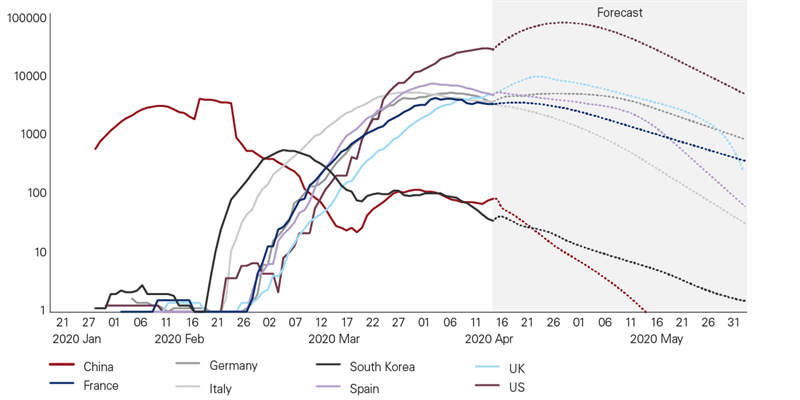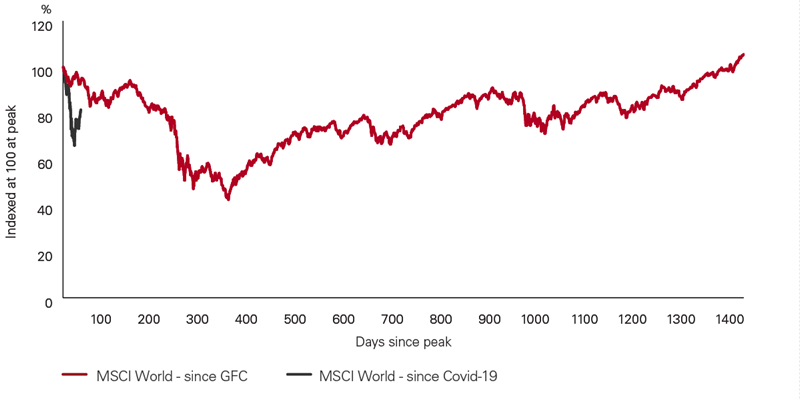Trying to figure out how and when global markets might escape this crisis is no easy feat but here are a few thoughts on the subject.
When and how will we exit this Covid-19 crisis economically? And how and to what extent will markets recover as we do?
With so much uncertainty still out there and little precedent to go on – at least in modern times – answering these questions is as much art as it is science.
But one thing is for sure: it starts and ends with the virus itself.
Most of you by now will doubtless be familiar with the charts that show the different paths of contagion across countries and how these are gradually (but variously) levelling out as social distancing measures and lockdowns are implemented. In the case of some Asian countries, and Italy and Spain too, the number of new cases appears to have peaked and is declining. In the UK, France and Germany they could yet peak in the next week or two.
What our chart below seeks to do is take it further by roughly extrapolating these curves, as shown by the dotted lines, to show what could happen in the weeks ahead.
And what it suggests is that life could normalise in Europe as early as the summer as the pandemic wanes and the mitigation measures are lifted. After all, we’ve already begun to see this in Wuhan, where the outbreak is believed to have begun.
Forecast daily new cases of Covid-19 (7-day averages, log scale)

So there are some grounds for optimism, which is partly why markets have recovered in recent days
But the simple reality is that we’re not quite there yet. Rather than a glimmer of light at the end of the tunnel, it could be a false dawn. As we’re starting to see in China, South Korea and Singapore, the danger is that a second wave of infection emerges.
In the absence of a Covid-19 vaccine (or even herd immunity), there are two possible ways out that could buy us some time: a rigorous process of testing and tracking sick patients to prevent further serious outbreaks and/or a ‘pulsing’ approach, in which lockdown measures are relaxed and then re-introduced, possibly many times.
So what might all this mean for the global economy? Firstly, that a rebound is likely in the second half of the year after a deep, sharp global recession in the first half.
How sharp a rebound, though, is unclear as it will depend on the precise details of the virus exit strategies that are followed. It is also difficult to see many industries bouncing back sharply even as lockdowns are relaxed, especially those relying on face-to-face interaction.
So we now foresee a grinding, slow second-half recovery rather than the sharp V-shaped one that many were talking about early in this crisis. Whichever virus scenario plays out, we estimate that average global activity in 2020 will likely be anything from 2% to 10% lower than in 2019.
Market implications
What about markets? Do they have further to fall or have they already reached their low point?
The honest answer is ‘I don’t know’. But one way to consider this question is to compare recent share price falls with how markets behaved during and after the global financial crisis (GFC).
In that simple respect, there is certainly room for further declines. As the chart below shows, although global shares have fallen much more quickly, they haven’t yet registered the 50%-plus falls we saw from peak to trough 12 years ago.
Global equity performance

Past performance is not a reliable indicator of future results.
Source: Bloomberg, Vanguard ISG. MSCI All-Country World Index. “Since GFC”, Oct 31 2007 = 100. “Since Covid-19”, Feb 18 2020 = 100. Data as of 7 April 2020.
On the other hand, even if the global economy recovers only slowly in the second half of the year, it will still likely be a faster recovery than the protracted loss of activity seen during the GFC. Back then the world faced a chronic debt crisis requiring lengthy treatment. This time it faces an acute external shock.
We’re no doubt going to see some horrible earnings numbers reported by companies in the coming weeks, but even with a potential 20% hit to GDP in the second quarter it would be hard to rationalise the 20% fall in equity prices that we’ve seen so far on the grounds of the stream of future profits alone.
Instead, much of the recent fall in the market has been driven by a sharp rise in the risk premium. And we know that risk premia have a tendency to mean revert.
That suggests the market ought to correct at some point. When exactly, though, is anybody’s guess.
Other important information
For professional investors only (as defined under the MiFID II Directive) investing for their own account (including management companies (fund of funds) and professional clients investing on behalf of their discretionary clients). Not to be distributed to the public. In Switzerland, for professional investors only.
The material contained in this article is not to be regarded as an offer to buy or sell or the solicitation of any offer to buy or sell securities in any jurisdiction where such an offer or solicitation is against the law, or to anyone to whom it is unlawful to make such an offer or solicitation, or if the person making the offer or solicitation is not qualified to do so. The information in this article does not constitute legal, tax, or investment advice. You must not, therefore, rely on the content of this article when making any investment decisions.
The opinions expressed in this article are those of individual speakers and may not be representative of Vanguard Asset Management, Limited.
The funds or securities referred to herein are not sponsored, endorsed, or promoted by MSCI, and MSCI bears no liability with respect to any such funds or securities. The prospectus or the Statement of Additional Information contains a more detailed description of the limited relationship MSCI has with Vanguard and any related funds."
Issued by Vanguard Asset Management, Limited which is authorised and regulated in the UK by the Financial Conduct Authority. Issued by Vanguard Investments Switzerland GmbH.
© 2020 Vanguard Asset Management, Limited. All rights reserved.
© 2020 Vanguard Investments Switzerland GmbH. All rights reserved.